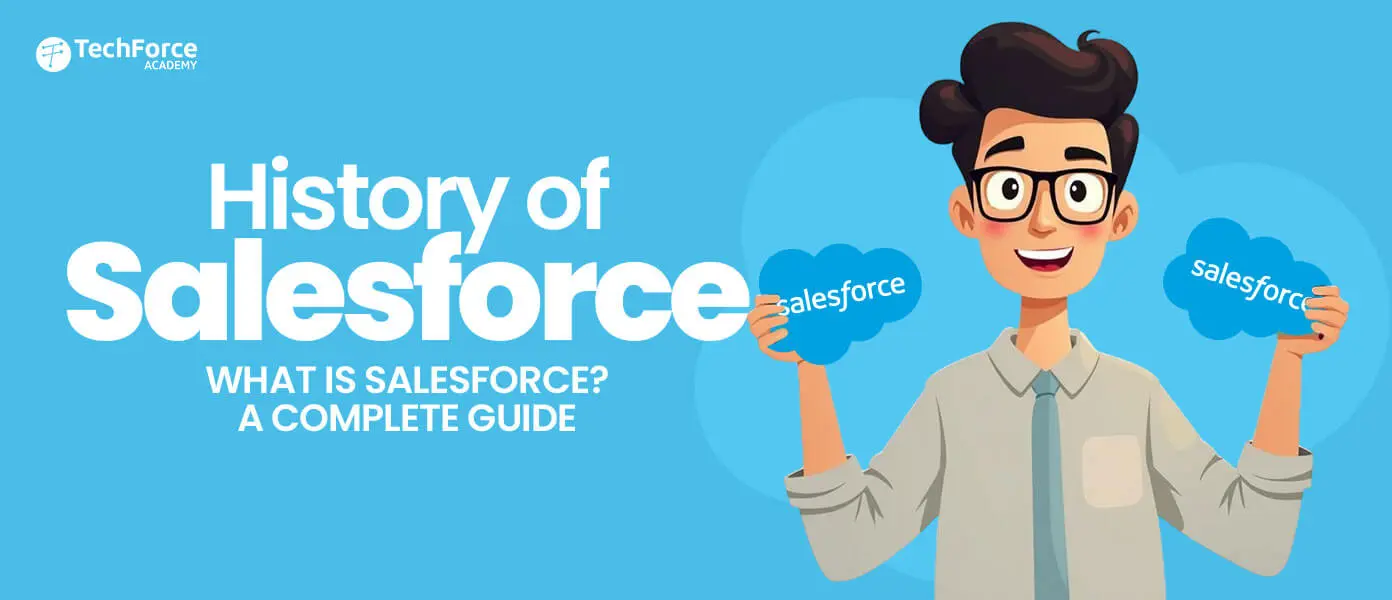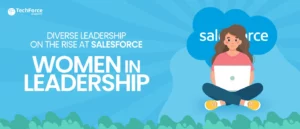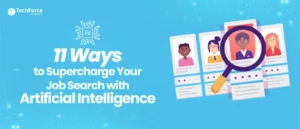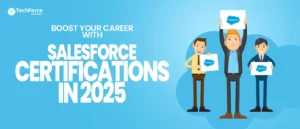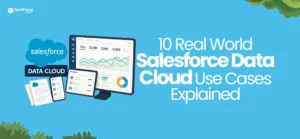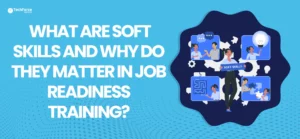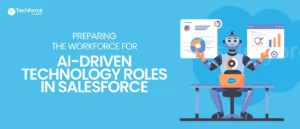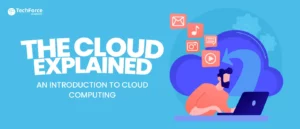Salesforce has grown into much more than just a traditional CRM. Its artificial intelligence, automation, analytics, and cloud computing power businesses around the globe. The history of Salesforce is marked by constant innovation and a commitment to customer success.
From the revolutionary “No Software” approach to becoming the #1 CRM provider, Salesforce continues its mission to shape the future of digital transformation.
This blog will discover how a CRM start-up born as a cloud business on Salesforce became the world leader in business technology. Here’s a step-by-step history, key innovations, and what’s coming next in 2025 and beyond.
What is Salesforce?
Salesforce is a platform that provides tools for managing customer data, automating processes, and analysing data.
It also makes tasks easier for its users. It automates repeating work, performs data analysis about customer needs, and creates an app without significant coding. Salesforce lets companies stay well connected to their customers, allows them to streamline their processes, and improves their service.
Imagine this:
- You do not have disarrayed notes and spreadsheets; instead, all information on your customers is kept in a single place.
- New customers could be sourced through targeted marketing campaigns.
- Close deals much faster with streamlined processes.
In a nutshell, Salesforce is what enables businesses to know their customers better and create more relationships with them for higher sales and customer satisfaction.
Vision
Frank Dominguez, Dave Moellenhoff, Parker Harris, and Marc Benioff launched Salesforce in 1999.
At that time, its vision was based on changing how businesses would interrelate with their customers utilising the power of the cloud. They felt that by moving CRM applications to the cloud, it becomes accessible to anywhere, at any time, and via any device.
Salesforce Headquarters and Global Operations
Headquarters: San Francisco, CA, USA.
Global Presence: Operations in Australia, India, Germany, UK, Japan, and more.
Benefits for businesses

- Improved Customer Relationships: Salesforce provides a 360-degree view of customers, enabling businesses to understand their needs and preferences better.
- Increased Sales Productivity: Automating sales and marketing processes frees up sales teams to focus on closing deals.
- Improved Customer Service: Simplified customer service processes translate into faster resolution times and increased customer satisfaction.
- Better Decision Making: Real-time data and analytics provide useful insights into business performance.
- Scalability and Flexibility: Its cloud-based nature allows Salesforce to scale up or down as business needs change.
Key Features and Offerings
Cloud Platform
- Accessibility: With an internet connection, you may access data and apps from any location.
- Scalability: It can be scaled up or down quickly based on demand.
- Reliability: Salesforce manages infrastructure and security, and hence, availability and data are secured.
- Reduced IT Cost: No investment is required to maintain hardware and software on-premises.
Core CRM Solutions
- Sales Cloud: It guides the customer journey through the sales cycle from lead generation until the actual closing of the deal.
- Service Cloud: It leads the way to customer service related to the greater achievement of consumer satisfaction.
- Marketing Cloud: Enable marketers to strategise, execute, and measure the marketing campaign.
- Commerce Cloud: Provides a platform for businesses to manage their online stores.
Enhanced Customer Engagement
Salesforce’s integrated suite of clouds, Sales Cloud, Service Cloud, Marketing Cloud and Commerce Cloud, facilitates seamless customer interactions across all touchpoints.
Innovation and Extensibility
- Revenue Growth & AI Integration: Use intelligent automation to optimise workflows and drive revenue.
- AppExchange Ecosystem: Extend Salesforce functionality with custom solutions and third-party integrations.
Interested to learn more about Salesforce and its fundamentals? Enroll in our Salesforce Admin training course.
The History of Salesforce

(1999-2004)
1999 – Frank Dominguez, Dave Moellenhoff, Parker Harris, and Marc Benioff founded it in 1999.
2000 – As part of the “No Software” marketing campaign, Salesforce.com was launched.
2001 – Reached 3,000 customers; released major automation and reporting updates.
2003 – Launched Dreamforce, its annual flagship event.
2004 – Salesforce IPO on NYSE, raising $110 million.
Read more about Dreamforce 2025.
(2005-2015)
2005 – Launch of AppExchange Marketplace.
2006 – Introduction of Apex (Salesforce’s programming language).
2009 – Service Cloud launched for customer support automation.
2011 – Acquisition of Radian6 for social media monitoring.
2012 – Marketing Cloud strengthened with ExactTarget acquisition.
2013 – Salesforce went mobile in with the release of its mobile development platform, Salesforce1.
2014 – Became the world’s No.1 CRM provider. It launched the Trailhead learning platform at Dreamforce.
2015 – Salesforce Lightning was introduced.
(2016-2020) AI, Cloud Expansion & Digital Transformation
2016 – Launched Einstein AI for predictive analytics.
2018 – MuleSoft acquisition enhanced API and data integration.
2019 – Acquired Tableau for advanced data visualisation.
2020 – Salesforce’s remote working significantly increased during the COVID-19 pandemic.
(2021-2024) Post-Pandemic Growth & AI Integration
2021 – Acquired Slack for $27.7 billion, strengthening collaboration tools.
2023 – Salesforce announced Einstein GPT. Einstein GPT is a generative AI tool that creates auto-generated content within the Salesforce platform.
2024 – Positioned as a leader in AI-powered CRM solutions. Launch of Agentforce and Agentforce 2.0.
Read more: Salesforce evolution.
Salesforce in 2025 and Beyond
With further advancements in AI automation, and blockchain technology, the Salesforce platform is expected to improve with time.
AI-Powered Transformation
- Einstein GPT: This generative AI technology is expected to revolutionise Salesforce’s offerings by automating tasks, generating personalised content, and providing predictive insights.
Einstein GPT will empower businesses to enhance customer experiences and boost productivity.
- Agentforce: Salesforce Agentforce is the next wave of AI in Salesforce, empowering businesses with fully autonomous AI agents. AI-driven autonomous agents, make business functions entirely automatic and make a better, far more efficient human.
-
Agentforce 2.0: Agentforce 2.0 focuses on more powerful and fully self-contained autonomous AI that solves all kinds of very complex problems themselves.
The Enduring Impact of the Pandemic
- Remote and Hybrid Work: The pandemic accelerated the shift towards remote and hybrid work models. Salesforce with its robust collaboration tools like Slack and Quip is well-positioned to capitalise on this trend by providing seamless solutions for distributed teams.
- Digital Transformation: COVID underscored the criticality of digital transformation for businesses. Salesforce’s cloud-based solutions enable companies to adapt quickly to changing market conditions and enhance their digital presence.
Strategic Initiatives
- Industry-Specific Solutions: Salesforce is deepening its focus on industry-specific solutions, such as those for healthcare, financial services, and manufacturing. By tailoring its offerings to the unique needs of these sectors, Salesforce can achieve deeper market penetration and stronger customer loyalty.
- Sustainability: As sustainability becomes increasingly important for businesses and consumers, Salesforce is integrating sustainability features into its platform. Tools like Net Zero Cloud and Sustainability Cloud empower businesses to measure, track, and reduce their environmental impact.
Challenges and Opportunities
- Competition: The CRM market is highly competitive with Microsoft, Oracle, and SAP fighting for the pie in the market. Salesforce has to continuously innovate and differentiate its offerings to keep leading.
- Data Security and Privacy: As businesses rely increasingly on cloud-based solutions, data security and privacy are paramount. Salesforce must invest heavily in robust security measures to protect customer data and comply with evolving regulations.
- Talent Acquisition and Development: The company will need to attract and retain top talent with the skills needed to develop and implement AI-powered solutions.
Elevate Your Salesforce Skills with TechForce Academy
Launch your career in the high-demand world of Salesforce and CRM with TechForce Academy. We offer comprehensive training programs designed to prepare you for in-demand Salesforce certifications and real-world success.
Become Salesforce Certified: Prepare for and achieve industry-recognized certifications, including Administrator, Developer, Sales Cloud, and Service Cloud.
Expert Instruction: Learn from highly qualified instructors with extensive experience in Salesforce and emerging technologies. Our instructor-led training is dedicated to providing you with the knowledge and skills you need to succeed.
Looking Ahead: The Future of Salesforce
The innovations at Salesforce include cutting-edge technologies such as AI, machine learning, and IoT, incorporated into its platform. The future of Salesforce holds the promise to be even more intelligent and personal with customer experience and to make businesses thrive within this competitive landscape.
As the pace of embracing business digital transformation quickens, so will the success of Salesforce because it remains critical in customer relationship management ever evolving.
Conclusion
Salesforce is committed to continuous innovation, integrating cutting-edge technologies like AI, machine learning, and IoT to redefine CRM’s future. The company uses AI to enable businesses to deliver highly personalized customer experiences and utilizes IoT data to proactively engage with customers.
Additionally, we observe Salesforce streamlining business operations through smart workflows. For instance, AI might predict customer requirements prior to them being articulated, while interconnected gadgets could facilitate proactive service driven by live usage data.
The rapid speed of digital transformation drives the need for smart CRM. Salesforce is at the forefront of empowering businesses to succeed.

